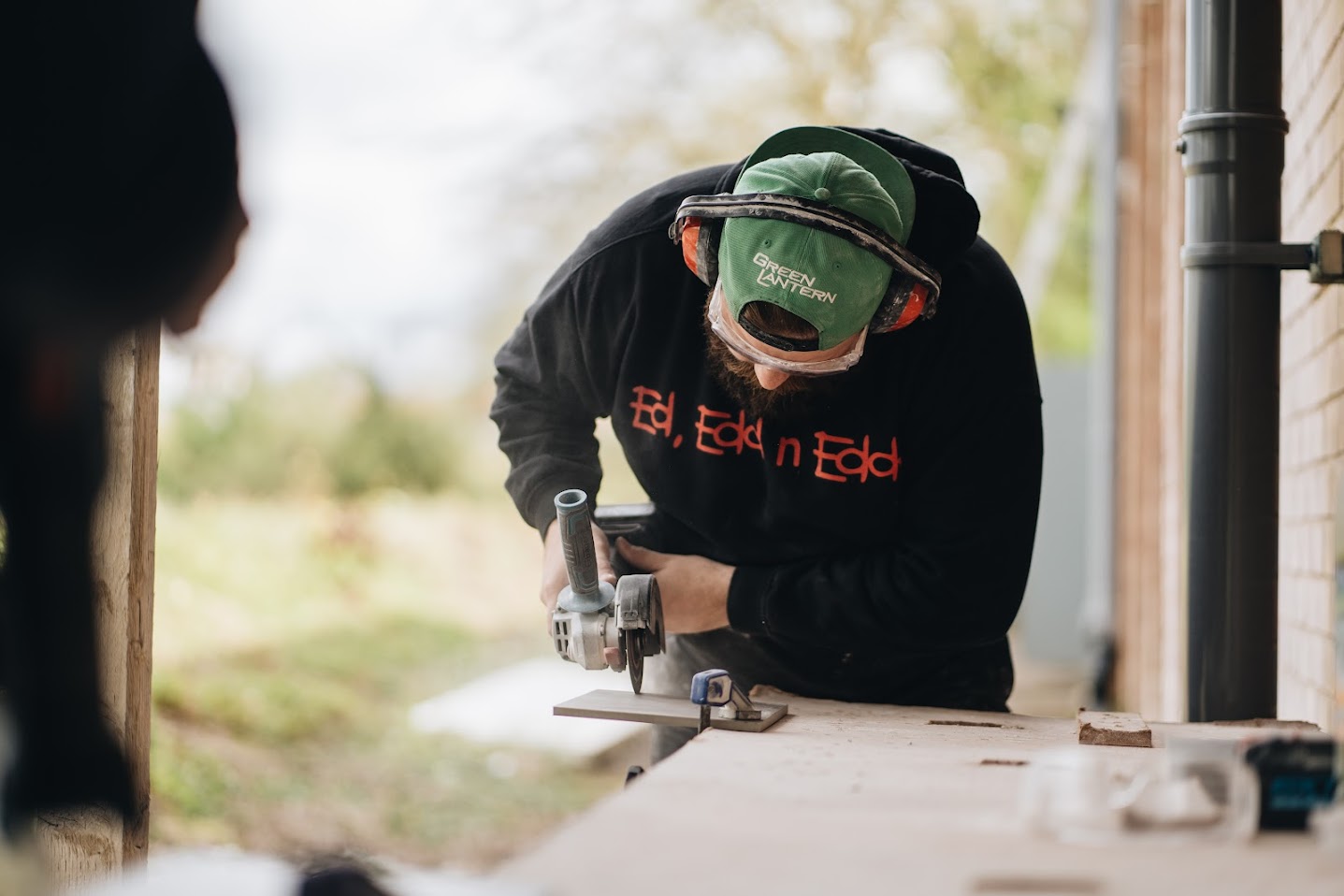How To Start Your Own Tiling Business

Finishing a tiling course is an incredible feeling. You walk away with new skills, a bit more confidence and a clear idea of what good workmanship looks like. The next step is deciding what you want to do with those skills. Some people start slowly by taking on small weekend jobs. Others join a building firm. And then there are the people who like the idea of running their own business. If you fall into that last group, you are not alone. Plenty of tilers start their own business once they have the basic skills in place. The good news is that it is more achievable than you might think, as long as you approach it in a steady and sensible way. While we cover a lot of what you need to know when starting a tiling business in our 13 day course, today we are breaking down the basics of starting a tiling business for anyone who may be curious.
Starting a tiling business is not just about how well you cut tiles or how neat your grout lines look. Those things matter, but they are only part of the picture. Running a business involves planning, organisation, customer service and a bit of marketing. It also involves knowing when to say yes to a job and when to step away. A lot of this comes with experience, but you can give yourself a head start by understanding what is involved before you begin.
Get Your Foundations In Place
Once you have finished your course, take a bit of time to practise. Confidence is important, but so is speed. A new tiler usually spends longer on each job than someone who has been doing it for years, and that is completely normal. Do your bathroom at home if it needs updating. Help a friend with a small splashback. Every hour spent practising will help you work more smoothly once you start taking paid jobs.
The next thing is to gather the tools you will need. Focus on the key tiler tools and try and buy from reputable brands. Start with essentials like a decent tile cutter, trowels, mixing paddle, buckets, levels, spacers, sponges and protective gear. Add power tools such as a laser level and wet saw as they will make life a lot easier and help you to achieve a professional finish.
Registering Your Business
In the UK, most self employed tilers register as a sole trader. This is simple to set up and it keeps paperwork to a minimum. You only need to register with HMRC, keep basic records of what you earn and file a tax return once a year. There is also the option to register as a limited company. Some tradespeople do this when they want to appear more established or when their earnings grow. There is no right or wrong route. The important thing is that you choose what suits you at the time. You can always change it later.
Make sure you look into public liability insurance. This protects you if something goes wrong during a job. It is not expensive for tilers and it gives you peace of mind. Some people also add tool insurance, especially if they have invested in more expensive equipment.
Working Out Your Prices
Pricing is one of the areas new tilers worry about the most. Charge too little and you struggle to cover your costs. Charge too much and you risk putting people off. The truth is that pricing takes practice. You will get better with each job.
There are a few things to think about. The first is how long the job will take. A small splashback might be half a day, while a full bathroom could be several days. Then there are travel costs, materials, any disposal fees and the type of tiles being used. Porcelain and natural stone usually take longer to cut and install than ceramics, so the labour charge is often a little higher.
Take your time when preparing quotes. Ask questions, measure carefully and check the condition of the walls or floors. If a surface needs extra preparation, include it in the quote. Customers appreciate honesty and clear communication. Once you give a price, stand by it unless something unexpected appears and you need to discuss the change. Clear quoting sets the tone for the entire job.
Building A Portfolio When You Have No Customers Yet
One challenge for new tilers is showing examples of their work when they have not taken on many jobs. You can start by taking photos during your course, as long as the provider is happy for you to do so. Many tiling centres encourage this. It is also worth taking pictures of any practice jobs at home or small jobs you do for friends and family. Good quality before and after photos are valuable. Potential customers like seeing proof of your attention to detail.
Use simple lighting and try to take photos straight on, without clutter in the background. These images will form the basis of your portfolio, your social media content and the gallery on your website whenever you decide to set one up.
Finding Your First Customers
The first paying customers are usually the hardest to find, but once you get going things become easier. Word of mouth is powerful in the trades, so focus on leaving a good impression with every job. Arrive on time, keep your workspace tidy and communicate clearly. These small things stand out more than you might think.
There are several ways to attract your first customers. Local Facebook groups often have people asking for recommendations, and a simple post introducing your services can bring in enquiries. Friends and family can also help by sharing your details. Flyers still work, especially in areas with lots of older homes. You can also list your business on online directories. Make sure your listings include clear photos, a short description of your services and a contact number.
Some new tilers also partner with small builders, plumbers or bathroom fitters who might need a reliable tiler to handle that part of the job. These relationships can grow into steady streams of work.
Looking Professional From Day One
When you start a business, the way you present yourself matters. A basic logo, tidy work clothes and a clean van go a long way. Many tilers choose simple branded clothing, even if it is only a t- shirt and a hoodie with their business name on it. Customers feel more comfortable when a tradesperson looks organised.
A simple website is worth setting up once you have a few photos to show. It does not need to be complicated. A home page, a gallery, a short description of your services and a contact form are enough at the start. Make sure your phone number and email address are easy to find. If you are comfortable with social media, create a Facebook page or Instagram account. Posting progress pictures, finished jobs and short explanations of what you have been working on helps people see what you can do.
Managing Your Schedule And Your Time
One thing new tilers often find surprising is how much time is spent outside of the actual tiling. You will need to respond to enquiries, create quotes, order materials and keep your records in order. It helps to set aside time for admin each week. Some people do it in the evenings, others on a Friday afternoon once their tools are cleaned and packed away. The key is staying consistent so you do not fall behind.
Be realistic with how many jobs you can take on. It is better to complete one job well than to rush through two. Overbooking leads to stress and unhappy customers. As you gain experience, you will find it easier to estimate how long each job will take.
Learning As You Go
Every tiler makes mistakes from time to time. It is part of the learning process. What matters is how you deal with it. If something goes wrong, fix it properly and take it as a lesson. The best tradespeople are the ones who keep improving. Many tilers return to short advanced courses once they have gained some experience, especially if they want to learn more about natural stone, wet rooms or commercial work.
Pay attention to what customers ask, what challenges you face on sites and which tools you find yourself reaching for the most. These small observations help you grow into a more confident and efficient tradesperson.
Growing Your Business Over Time
Once you have a steady flow of work, you can start thinking about how you want your business to grow. Some tilers focus on niche areas such as large format tiles, natural stone or high end bathrooms. Others take on an apprentice or work with another tradesperson so they can complete larger projects. There is no single path. What matters is choosing the direction that suits your strengths and the type of work you enjoy.
As your reputation grows, you can revisit your pricing, upgrade your tools and refine your workflow. You may decide to specialise in areas that pay more or require more skill. You may also decide to stay as a one person business and keep things simple. That choice is entirely yours, and that is one of the biggest benefits of being self employed.
Starting your own tiling business after completing a tiling course is a realistic and rewarding step for many people. With the right preparation, a sensible approach to money and a focus on good workmanship, you can build a business that keeps you busy and gives you plenty of satisfaction. It takes time, like any trade, but the journey is worth it. Every job teaches you something new and every customer is a chance to improve your reputation.
Take a look at our page on running a tiling business for more information.
Find the perfect course for you
Whether you're just getting started, or have a few years in the construction industry under your belt and are looking to up-skill yourself, we have a course for everyone.







